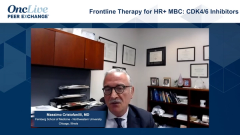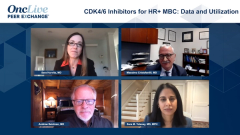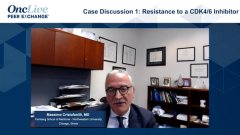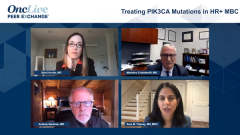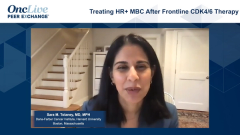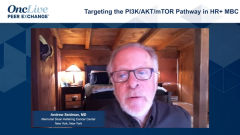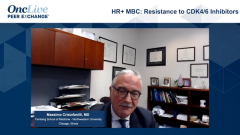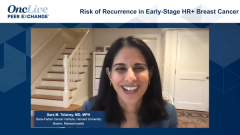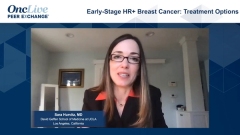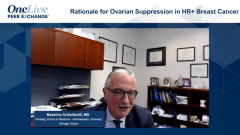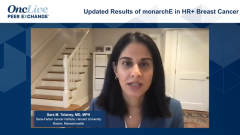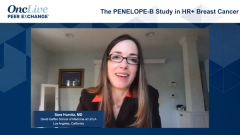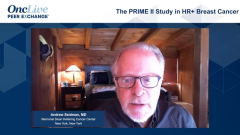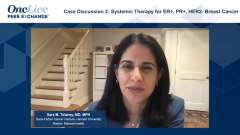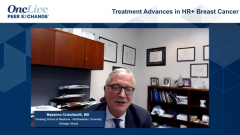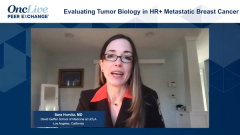
Case Discussion 2: Systemic Therapy for ER+, PR+, HER2- Breast Cancer
Breast oncologists review the appropriateness for treating a patient with ER-positive, PR-positive, HER2-negative breast cancer with systemic therapy, with special considerations regarding sequencing therapy if using a CDK4/6 inhibitor as adjuvant therapy.
Episodes in this series

Sara Hurvitz, MD: The last few minutes of our talk, we’re going to go through a challenging case, and I want to hear how everyone would address this. This will round out our ER-positive, early stage disease. We have a 41-year-old woman who has a 3-cm infiltrating ductal carcinoma in the left breast, ER expression 80%, PR is 60%, HER2 is completely negative. She has 2 palpable axillary lymph nodes, 1 is biopsy proven to have cancer in it. Our surgical colleague for some unknown reason does a 21-gene recurrence score [RS] that returns with an RS of 28. What would you recommend at this point for this patient, who’s clinically T2N1, ER/PR-positive, and you have an Oncotype DX score of 28. Sara, any thoughts here?
Sara M. Tolaney, MD, MPH: This is someone I think we all would want to give chemotherapy to, given that higher recurrence score in a premenopausal patient. Obviously, in this patient with multiple nodes involved, we would be recommending chemotherapy anyway. Standardly, I typically would use anthracycline and taxane-based therapy, so usually I use dose-dense ACT [doxorubicin, cyclophosphamide, paclitaxel] in this particular setting.
Sara Hurvitz, MD: OK, good. She does receive neoadjuvant dose-dense AC [doxorubicin, cyclophosphamide] followed by paclitaxel for 2 weeks. She has a partial response. She has breast-conserving surgery with axillary staging, and she interestingly has a complete response [CR] in the breast. However, she has 3 out of 10 nodes involved by cancer still, a 5-mm deposit without extracapsular extension, which I think is a pretty vigorous response for an ER/PR-positive tumor. But owing to the biology of her cancer, it’s interesting to see that she was able to get rid of all the cancer in the breast but not the nodes. Now is the tricky part. We want to meet with her after her surgery, and she knows she’s doing radiation obviously, but she wants to talk about adjuvant systemic therapy. Massimo, take us through what you would recommend here in terms of adjuvant systemic therapy. Would you offer her more chemotherapy, capecitabine? What would you talk to her about here?
Massimo Cristofanilli, MD: We have repeated biomarkers, and we know that she is clearly ER/PR-positive. The biomarkers have not changed after neoadjuvant therapy. There is no indication for additional chemotherapy. It’s not surprising that she has not achieved a pathological CR. She could have done surgery up front right away without the neoadjuvant treatment. She’s premenopausal, so definitely ovarian ablation, endocrine therapy. And the question is, if a CDK4/6 inhibitor becomes available, if it is approved in the next few months, would you add it at some point?
Obviously, the woman is young and she does have a risk of recurrence. I don’t think we have, as you said, data for follow-up for a specific subset of patients—this is 3 lymph nodes after neoadjuvant. If the patient is dedicated and reads about the news, she will ask about CDK4/6. It will be a challenging discussion. Of course, the insurance will not support it, and we have no way to prescribe this drug at this point and get her to take it for 2 years. I would say that in a few months we may be having a new standard of care, and this patient may well be treated with abemaciclib.
Sara Hurvitz, MD: So you would offer it to this patient if it were FDA approved and available?
Massimo Cristofanilli, MD: Yes.
Sara Hurvitz, MD: OK. What about you, Sara?
Sara M. Tolaney, MD, MPH: This patient would have been eligible for the monarchE trial and so would meet criteria for it. We are seeing benefit from that trial, so I would offer it to the patient. But I would have an honest discussion with the patient that we don’t have long-term follow-up data from it, and it is possible that with longer follow-up, that benefit could go away. And there certainly are toxicities, and we do have to make sure that that patient isn’t at undue risk for some of those events. Particularly on monarchE, there’s a higher rate of VTE [venous thromboembolism] with the tamoxifen combination. So there are things that I would think about when having this discussion, but I would offer it to her.
Sara Hurvitz, MD: Andrew, would you offer it to her? And if you wouldn’t, is there a different patient where you might offer it if it were available?
Andrew Seidman, MD:A couple of things. No. 1, I would pick up the phone and call the surgeon and tell them not to order Oncotype tests on patients in the future. We’re in an interesting moment. We have the PALLAS trial, which was negative, again a different CDK4/6 inhibitor, a shorter duration, as was pointed out. We’re waiting on ribociclib data from NATALEE, and we have the monarchE data, and the data are what they are. They are showing a disease-free survival benefit in a high-risk population. This woman fits that population, and I would have this discussion, and that discussion would include a lot of talk about GI [gastrointestinal] toxicity. A significant proportion of patients in monarchE had dose reductions and dose holds. But it’s a reasonable consideration for this patient, in addition to her ovarian suppression and AI [aromatase inhibitor] probably for 10 years, perhaps her bisphosphonate. I’d be curious if my colleagues would entertain giving capecitabine per CREATE-X in this patient.
Sara Hurvitz, MD: I think Massimo said no further chemotherapy. I personally wouldn’t. Sara, would you use capecitabine here?
Sara M. Tolaney, MD, MPH: No, I generally have not used it in ER-positive patients, given the subgroup analysis in CREATE-X, without benefit in the ER-positive patients.
Transcript edited for clarity.


